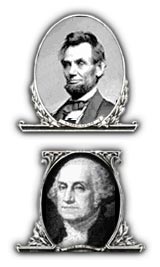Presidents' Day or Washington's Birthday?

In honor of one (or two) of the greatest presidents.
 Related Links
Washington's BirthdayGeorge Washington was born on Feb. 11, 1731, according to the Julian calendar. In 1752, however, Britain and her colonies adopted the Gregorian calendar, jumping ahead 11 days and making January the first month of the year instead of March. According to this calendar, Washington's birthday occurred on Feb. 22, 1732. The federal holiday was celebrated on Feb. 22 until 1971, when it was moved to the third Monday in February. |
Well, according to the federal government, the holiday observed on the third Monday in February is officially Washington's Birthday. But many Americans believe that this holiday is now called "Presidents' Day," in honor of both Presidents Washington and Lincoln, whose birthdays are Feb. 22 and Feb. 12, respectively. It turns out that whether you honor one or the other or both of these presidents may depend on where you live.
States Decide on Holidays
The states are not obliged to adopt federal holidays, which only affect federal offices and agencies. While most states have adopted Washington's Birthday, a dozen of them officially celebrate Presidents' Day. A number of the states that celebrate Washington's Birthday also recognize Lincoln's Birthday as a separate legal holiday.
When Was the First Public Celebration of Washington's Birthday?
Washington's Birthday has a history as old as our country. It was celebrated publicly for the first time in the late 18th century, while George Washington was still president.
Washington's Birthday became official in 1885, when President Chester Arthur signed a bill making it a federal holiday. Meanwhile, there was President Lincoln's birthday on Feb. 12, which never became a federal holiday but was celebrated as a legal holiday in many states outside the old Confederacy.
Origins of the Monday Holiday
In 1968, Congress passed the Monday Holidays Act, which moved the official observance of Washington's birthday from Feb. 22 to the third Monday in February. Some reformers had wanted to change the name of the holiday as well, to Presidents' Day, in honor of both Lincoln and Washington, but that proposal was rejected by Congress, and the holiday remained officially Washington's Birthday.
Nevertheless, there was a popular misconception that the day had been officially renamed, a misconception only reinforced by the fact that the third Monday in February can only occur between Feb. 15 and Feb. 21. This means that the holiday is always after Lincoln's birthday and before Washington's birthday, without ever coinciding with either. Furthermore, some states which had previously celebrated Lincoln's Birthday dropped the observance after the federal holiday reforms, supporting the notion that the two presidential birthdays had been combined.
While the name change has never been authorized by Congress, it has gained a strong hold on the public consciousness, and is generally used on calendars, in advertising, and even by many government agencies. There have been attempts to introduce legislation requiring federal agencies to call the day Washington's Birthday, but these have never gotten very far. No matter what's in the law books, the popular usage is now well established.
You Can't Please All of the People...
Many people feel that Lincoln, the president credited with preserving the nation during the Civil War, has been short-changed. To them, having Presidents' Day is a sensible way to recognize both Washington and Lincoln. Others feel just as strongly that having an inclusive Presidents' Day diminishes Washington's importance in American history.







